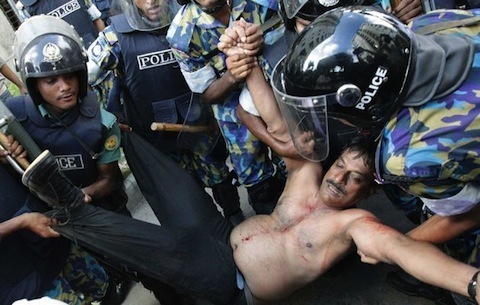Justice Too Swift

Years back, in an effort to quell football fan violence, authorities in Philadelphia set up a courtroom at Veterans Stadium, so that drunken brawlers could be punished within minutes of being arrested. Sure, such a legal arrangement wasn't in the constitutional spirit, since the accused weren't permitted legal representation or a chance to review the charges against them. But no one could get too worked about the plight of Eagles fans, who are far from a popular bunch.
The same cant be said for Bangladeshi protestors, who are now taking to the streets to voice their opposition to a key electoral change. One of the government's key weapons against these strikers is a system of mobile courts, ostensibly set up to enforce the nation's anti-tobacco laws. In reality, though, the courts are being used to route around the rule of law:
It is well and true that the Mobile Courts Act 2009 gives almost unfettered discretion to mobile courts to "hold a person guilty". It is in this unrestricted discretion that the illegality and unconstitutionality of this system lies. The "super power" given under the Act to mobile courts means that these courts are absolved of all the procedural and evidential requirements that exist to protect the rights of an accused person – the right to consult a lawyer, the right to defend himself, the right to cross-examine the prosecution's evidence, the right to produce his own witnesses, the right to make a closing argument explaining his story to the court and so on. None of these rights exist for a person whom a mobile court has got a hold of and, unfortunately for him, the age-old principle – "Innocent until proven guilty" stands corrected as "Guilty until proven innocent".
The courts remind me of something I reported on for Now the Hell Will Start: the military's use of special courts-martial during World War II. The proceedings were designed to be as expedient as possible, so that the Army could get on with its main job of fighting the Axis. But in practice, the utter lack of legal protections for defendants meant that commanding officers could effectively punish at will for any minor infraction. In Bangladesh, that power is now in the hands of riot police, whose accusations obviously carry the most weight at mobile court proceedings. No good can possibly come of that.
(Photo for Reuters by Andrew Biraj)




